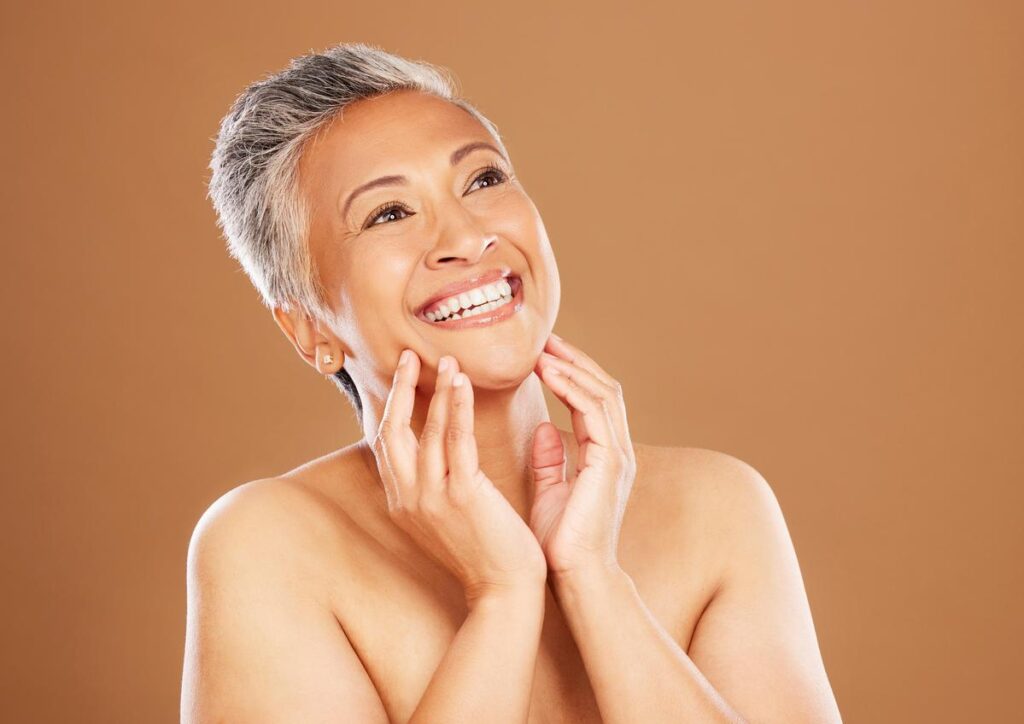Summary
- Key Skincare Ingredients: Use creams with retinoids, hyaluronic acid, and vitamin C for anti-aging.
- Sun Protection: Apply sunscreen (SPF 30-50) daily to prevent UV-induced wrinkles.
- Diet & Hydration: Eat antioxidant-rich foods and omega-3s like salmon; stay hydrated.
- Avoid Smoking: Quit smoking to preserve collagen and blood flow in skin.
- Stress & Sleep: Manage stress with relaxation techniques and get enough sleep.
- Natural Remedies: Aloe vera and coconut oil can hydrate and improve skin texture.
- Vitamins & Supplements: Consume vitamin C, E, and collagen supplements for skin health.
- Skincare Routine: Cleanse, apply retinoids and moisturizers for daily skin care.
- Dermatologist Advice: Seek tailored solutions and non-surgical treatments for wrinkles.
Are you tired of those pesky wrinkles showing up before their time? You’re in luck! I’m here to guide you toward wrinkle-free skin naturally. We’ll explore everything from the best anti-aging creams to effective lifestyle changes and natural remedies. You’ll discover how SPF can be your best friend, why sleep is vital for skin health, and which vitamins can supercharge your skin’s elasticity. Ready for youthful, radiant skin? Let’s dive in!
What are the most effective wrinkle-free skincare solutions?
Wrinkle-free skincare solutions often start with the right topical treatments. These include creams and serums that help reduce wrinkles by boosting collagen. One crucial element, retinoids, is known to improve skin texture and increase collagen production. Retinoids, a form of vitamin A, can be found in both prescribed and over-the-counter retinoids for wrinkles. A dermatologist can help you choose the right one.
When selecting anti-aging creams, it’s important to look for key ingredients. Effective creams often contain hyaluronic acid and vitamin C. Hyaluronic acid helps hydrate your skin. Vitamin C brightens your skin and reduces lines. Together, they form a strong defense against aging signs.
Sun protection is another vital part of any wrinkle-free skincare routine. Sunscreens with an SPF of 30 to 50 should be used daily, no matter the weather. UV rays damage skin and speed up aging, so never skip this step. Consistent use of sunscreen helps prevent this damage and reduces new wrinkles.
Diet and healthy habits also support wrinkle-free skin. Foods rich in antioxidants and omega-3s, like salmon and avocados, aid skin health. A healthy diet provides nutrients that your skin needs to look youthful. Staying hydrated is equally important, as it keeps skin plump and elastic.
Avoid smoking to maintain your skin’s collagen levels. Smoking reduces blood flow and damages skin structure. Quitting can slow down wrinkle formation significantly.
Being mindful of facial movements and stress can also help. Repeated expressions create lines over time. Practice exercises and relaxation to limit this. Techniques like yoga and mindfulness help relax the face and support healthy skin.
Remember, while wrinkles are part of aging, these solutions can help prolong smooth, youthful skin. Always consider consulting a healthcare expert for advice tailored to you.
How can lifestyle changes prevent aging skin?
What daily habits help keep skin young? The Study on Sunscreen Use proves sunscreen is key. Apply a sunscreen with SPF 30 to 50 every day. It guards against UV rays that cause wrinkles. Sunscreen isn’t just for sunny days. It works every day, rain or shine.
Healthy skin needs more than sunscreen. Eating right helps a lot. A diet full of antioxidants and nutrients, like in salmon and berries, fights wrinkles. These foods keep skin elastic and vibrant. Water is a secret hero here, too. Drink lots to keep skin moist and firm.
Stress affects skin in surprising ways. But how does stress impact skin aging? Stress makes skin age faster by breaking down collagen. Relaxation techniques like yoga or deep breaths help skin stay smooth by easing stress’s impact. Less stress can mean fewer lines.
Why is sleep key to skin renewal? During sleep, the body heals itself. Sleep helps skin make new cells and repair damage. Lying on your back when you sleep keeps skin smooth. It stops lines from forming on your face overnight. Silk pillowcases are a nice touch, reducing friction and keeping skin soft.
Stop smoking to protect your skin. Smoking ruins skin’s collagen and steals its glow. Studies on twins show smokers have more wrinkles than non-smokers. Quitting smoking can let skin heal and stave off wrinkles.
Lifestyle changes for wrinkle-free skin include relaxing more and eating better. These steps support skin health and delay aging signs. To get wrinkle-free skin naturally, start by taking sunscreen, diet, and stress seriously.
Are natural remedies effective for smooth skin?
You might wonder, “Are natural remedies good enough for smooth skin?” The answer is yes, they can offer benefits. Natural ingredients are known for their potential to reduce wrinkles. One effective option is aloe vera. It is soothing and hydrates the skin. Another choice is coconut oil. Rich in fatty acids, it moisturizes deeply and improves skin texture.
Diet plays a massive role in your skin’s appearance, too. Eating right can make a difference. Nutritious foods like fruits and vegetables give your skin vitamins and antioxidants. Avocados and nuts provide healthy fats, which help maintain smooth skin. Also, green tea can fight inflammation, which can contribute to better skin health.
You may ask, “Are DIY face masks useful for anti-aging?” Yes, they can be. DIY face masks can include natural ingredients that hydrate and tighten skin. Mixing honey and yogurt, for example, can add moisture and promote smoothness. Honey is a natural humectant, attracting moisture to the skin, while yogurt’s lactic acid helps exfoliate gently.
Retinoids, derived from vitamin A, are also important for wrinkle care. They boost collagen production and improve skin texture. While some retinoids require a prescription, over-the-counter options do exist. For more detailed information on retinoids, you can explore Retinoids for Wrinkles.
But remember, healthy skin requires a holistic approach. It’s not only about what you apply on it; it’s also about lifestyle changes like drinking enough water. Staying hydrated keeps your skin elastic and less prone to wrinkles. Avoiding stress and getting good sleep also help. By relaxing, you avoid repeating facial movements, which can cause lines over time.
In conclusion, using natural remedies, maintaining a balanced diet, and considering lifestyle changes can work together to promote smooth, wrinkle-free skin. Each natural remedy holds potential, but remember to be consistent and patient to see results.
What role do vitamins and supplements play in skin health?
Vitamins and supplements can be powerful allies in achieving wrinkle-free skin. First, let’s talk about vitamins crucial for skin health. Vitamin C supports collagen production, keeping the skin tight and smooth. This vitamin also helps heal damaged skin and reduces fine lines. Vitamin E works as an antioxidant, protecting skin cells from damage. It also helps nourish the skin, making it soft and smooth.
Now, what about supplements? They can also support skin elasticity. Collagen supplements stand out for their wrinkle-fighting power. Collagen is a protein that keeps skin firm. As we age, collagen levels drop, leading to wrinkles. Taking collagen supplements can help increase your body’s collagen levels. This can lead to improved skin elasticity and reduced wrinkles.
But is there scientific backing for collagen supplements? Yes, studies support their effectiveness in improving skin hydration and elasticity. It’s important to choose the right type—hydrolyzed collagen is usually the best option. Additionally, supplements like Hyaluronic Acid help retain moisture, keeping skin plump and youthful-looking.
Always consult a doctor before starting any supplement to ensure it suits your body’s needs. Supplements and a diet rich in vitamins can work hand in hand. Foods like salmon and avocados are high in nutrients beneficial for skin health. A nutrient-rich diet along with supplements can help maintain smooth, youthful-looking skin. Smoking, stress, and improper diet can counteract the effects of these beneficial nutrients.
Remember, it’s not just about slapping on creams, but giving your body the building blocks it needs to rebuild the skin from the inside out. Healthy skin is a reflection of what you put into your body as much as what you put on it. Adopting a balanced lifestyle complete with both nutritious dietary choices and well-considered supplements might just be the wrinkle-free solution you’re looking for.
How can specific skin care routines prevent wrinkles?
A successful skincare routine for wrinkle prevention starts with key steps. Start each day by washing your face with a gentle cleanser. This removes grime and prepares your skin for nourishment. Then, apply a broad-spectrum sunscreen with SPF 30 to 50. Even if it’s cloudy, harmful UV rays can still age your skin.
Layering products correctly is important for the best results. First, apply any treatment products like serums or retinoids. Retinoids, derived from vitamin A, boost collagen and improve skin texture. Consider discussing with a dermatologist to find a retinoid that suits your skin. Afterwards, use a good moisturizer. Look for one with hyaluronic acid or vitamin C. These help keep skin hydrated and reduce signs of aging. Moisturizing locks in all the good stuff and ensures your skin stays soft and plump.
A solid nighttime skincare routine is vital for keeping your skin smooth and youthful while you sleep. At night, start by removing makeup and washing your face. This ensures your skin is clean before you apply your nighttime products. Next, use a thicker moisturizer or a night cream. These are often richer and help repair your skin as you sleep. Night is also the perfect time to apply retinoid products or serums with antioxidants. Your skin will absorb them better when it’s at rest and away from environmental stressors.
Keep in mind that your lifestyle choices outside of your skincare routine can also impact your skin’s appearance. Collagen in your skin decreases with age, leading to less elasticity and firmness. Eating foods rich in antioxidants, such as avocados and pomegranates, can help. Also, drink lots of water to keep your skin hydrated from the inside out. Sleeping well and managing stress are other key factors that will complement your wrinkle-preventing efforts. Combining a well-rounded skincare routine with these healthy habits will put your skin on the path to looking its best.
Are there dermatologist-recommended methods for combating wrinkles?
When looking to combat wrinkles, dermatologists often recommend non-surgical solutions. These include topical treatments, personalized skincare advice, and lifestyle changes that can significantly impact skin health over time.
What non-surgical treatments do dermatologists recommend? Dermatologists often suggest sunscreen with SPF 30 to 50 for daily use, even on cloudy days. Sunscreen protects your skin from UV damage, which is a leading cause of wrinkles. Next up is moisturizer; dermatologists recommend using one with ingredients like hyaluronic acid or vitamin C. These help your skin stay hydrated and maintain its elasticity. Also, they might recommend retinoids—derivatives of Vitamin A that you can learn more about here.
How can personalized skincare advice help reduce wrinkles? Dermatologists can provide advice tailored to your specific skin type and concerns. Not all skin types are the same, so personalized advice is crucial. They might suggest specific products or routines that best suit your skin’s needs.
Are retinoids the best option for anti-aging? Retinoids are highly praised for their ability to boost collagen and improve skin texture. However, they are not the only option. Some retinoids are available over-the-counter, while others require a prescription. It’s important to consult a dermatologist to find the right type and concentration for your skin. Remember that while effective, retinoids can sometimes irritate, making professional guidance very important.
In addition to these treatments, lifestyle changes make a difference. Staying hydrated, eating healthy foods rich in antioxidants, and adopting a proper sleep position can also help maintain youthful skin. By combining recommended treatments with smart lifestyle choices, you can fight wrinkles more effectively. Always consider seeing a dermatologist for expert advice that’s just right for you.
Conclusion
Achieving wrinkle-free skin involves a mix of topical treatments, lifestyle changes, and natural remedies. Skincare routines should integrate the right creams and SPF for protection. Incorporating vitamins, supplements, and dermatologist advice can also improve skin elasticity. Prioritizing sleep, reducing stress, and embracing healthy habits nurture long-lasting youthful skin. Natural ingredients and a balanced diet enhance skin texture effectively. Remember, combining these methods creates a holistic approach to maintaining smooth, vibrant skin. Embrace these strategies to enjoy a timeless and radiant complexion.








